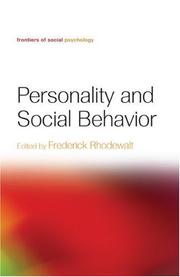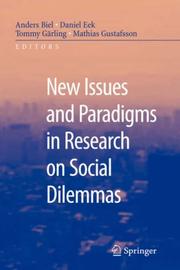| Listing 1 - 10 of 15 | << page >> |
Sort by
|

ISBN: 9780521881067 0521881064 9781139167451 9780521707442 9780511480430 0511480431 0511479638 9780511479632 1139167456 0511477228 9780511477225 0521707447 1107184770 1282001299 9786612001291 0511475780 0511478747 9780511478741 Year: 2008 Publisher: Cambridge ; New York : Cambridge University Press,
Abstract | Keywords | Export | Availability | Bookmark
 Loading...
Loading...Choose an application
- Reference Manager
- EndNote
- RefWorks (Direct export to RefWorks)
In The Normal Personality, Steven Reiss argues that human beings are naturally intolerant of people who express values significantly different from their own. Because of this intolerance, psychologists and psychiatrists sometimes confuse individuality with abnormality and thus over-diagnose disorders. Reiss shows how normal motives - not anxiety or traumatic childhood experiences - underlie many personality and relationship problems, such as divorce, infidelity, combativeness, workaholism, loneliness, authoritarianism, weak leadership style, perfectionism, underachievement, arrogance, extravagance, pompousness, disloyalty, disorganisation, and over-anxiety. Calling for greater understanding and tolerance of all kinds of personalities, Reiss applies his theory of motivation to leadership, human development, relationships, and counselling.
Personality. --- Persoonlijkheidspsychologie --- handboeken en inleidingen. --- Personal identity --- Personality psychology --- Personality theory --- Personality traits --- Personology --- Traits, Personality --- Psychology --- Individuality --- Persons --- Self --- Temperament --- Health Sciences --- Psychiatry & Psychology

ISBN: 9781841694504 1841694509 9780203838082 9781136875106 9781136875144 9781136875151 9780415650793 Year: 2008 Publisher: New York, NY ; Hove : ©2008 Psychology Press,
Abstract | Keywords | Export | Availability | Bookmark
 Loading...
Loading...Choose an application
- Reference Manager
- EndNote
- RefWorks (Direct export to RefWorks)
Personality. --- Social psychology. --- Personnalité --- Psychologie sociale --- Personnalité --- Personality --- Social psychology --- Mass psychology --- Psychology, Social --- Human ecology --- Psychology --- Social groups --- Sociology --- Personal identity --- Personality psychology --- Personality theory --- Personality traits --- Personology --- Traits, Personality --- Individuality --- Persons --- Self --- Temperament --- Comportement social
Book
ISBN: 1281734144 9786611734145 0387790985 0387790977 1441927107 Year: 2008 Publisher: New York : Springer,
Abstract | Keywords | Export | Availability | Bookmark
 Loading...
Loading...Choose an application
- Reference Manager
- EndNote
- RefWorks (Direct export to RefWorks)
In the post-Civil Rights era, there is a temptation to assume that racism is no longer the pressing social concern in the United States that it once was. The contributors show that racism has not fallen from the forefront of American society, but is manifest in a different way. According to the authors in this volume, in 21st century, skin color has come to replace race as an important cause of discrimination. This is evidenced in the increasing usage of the term "people of color" to encompass people of a variety of racial and ethnic backgrounds. The editor has compiled a diverse group of contributors to examine racism from an interdisciplinary perspective. Contributions range from the science of racism, from its perceived biological basis at the end of the 19th century, to sociological studies its new forms in the 21st century. The result is a work that will be invaluable to understanding the challenges of confronting Racism in the 21st Century.
Prejudices. --- Racism --- History --- Bias, Racial --- Race bias --- Race prejudice --- Racial bias --- Prejudices --- Anti-racism --- Race relations --- Bias (Psychology) --- Prejudgments --- Prejudice --- Prejudices and antipathies --- Attitude (Psychology) --- Emotions --- Consciousness. --- Sociology, general. --- Personality and Social Psychology. --- Apperception --- Mind and body --- Perception --- Philosophy --- Psychology --- Spirit --- Self --- Sociology. --- Personality. --- Social psychology. --- Mass psychology --- Psychology, Social --- Human ecology --- Social groups --- Sociology --- Personal identity --- Personality psychology --- Personality theory --- Personality traits --- Personology --- Traits, Personality --- Individuality --- Persons --- Temperament --- Social theory --- Social sciences

ISBN: 1281138479 9786611138479 0387721126 0387721118 1441924647 Year: 2008 Publisher: New York : Springer,
Abstract | Keywords | Export | Availability | Bookmark
 Loading...
Loading...Choose an application
- Reference Manager
- EndNote
- RefWorks (Direct export to RefWorks)
Positioning analysis penetrates beneath surface issues to their underlying psychological causes and social effects, with the intention of defusing conflict and preventing existing conflict from escalating. As the growing literature shows, positioning analysis methods are not only effective in interpersonal and intergroup problems, but have considerable potential for resolving disputes on the world stage. Global Conflict Resolution through Positioning Analysis starts with the daily disputes that result from our multiple social identities and evolving self-definitions, offers a new framework for understanding historical conflict, and brings vital new perspectives to current political and ideological battles. Twenty expert contributors examine scenarios as simple as a committee meeting of four people, as complicated as centuries-old social movements and the shifting tensions in the Middle East. Who speaks for Terri Schiavo?: a study in mutual hostility. Lawrence and Napoleon: military positioning, in victory and defeat. For and/or against one’s best interests?: a minority paradox. "Not the person I used to know": positioning in a case of dementia. Rwanda: the view from both sides of genocide. The nuclear edge: positioning by Iran, the European Union, and the U.S. Its scope of coverage and depth of vision make Global Conflict Resolution through Positioning Analysis a reference as vital to professionals—negotiators and conflict managers, social and peace psychologists—as to students and researchers studying peace and conflict.
Conflict management --- Interpersonal relations --- Intergroup relations --- Psychological aspects. --- Human relations --- Interpersonal relationships --- Personal relations --- Relations, Interpersonal --- Relationships, Interpersonal --- Social behavior --- Social psychology --- Object relations (Psychoanalysis) --- Conflict control --- Conflict resolution --- Dispute settlement --- Management of conflict --- Managing conflict --- Management --- Negotiation --- Problem solving --- Social conflict --- Crisis management --- Conflict, Intergroup --- Intergroup conflict --- Relations, Intergroup --- Social interaction --- Consciousness. --- Personality and Social Psychology. --- Apperception --- Mind and body --- Perception --- Philosophy --- Psychology --- Spirit --- Self --- Personality. --- Social psychology. --- Mass psychology --- Psychology, Social --- Human ecology --- Social groups --- Sociology --- Personal identity --- Personality psychology --- Personality theory --- Personality traits --- Personology --- Traits, Personality --- Individuality --- Persons --- Temperament

ISBN: 1281139130 9786611139131 0387725962 0387725954 1441944443 Year: 2008 Publisher: New York : Springer,
Abstract | Keywords | Export | Availability | Bookmark
 Loading...
Loading...Choose an application
- Reference Manager
- EndNote
- RefWorks (Direct export to RefWorks)
New Issues and Paradigms in Research on Social Dilemmas Edited by Anders Biel, Daniel Eek, Tommy Garling, and Mathias Gustafson Psykologiska Institutionen, Gotenburg University, Gotenburg, Sweden This edited volume has been compiled to present new theoretical and methodological developments in the field of social dilemma research. Social dilemmas are situations when there is a conflict between self-interest and collective interest. Research in this area has gained interest in the last twenty years in disciplines such as sociology, psychology, and economics. It also has wide applications to numerous real-world issues including environmental degradation, organizational management, and provision of societal public good. The three sections in the volume mirror the different levels of analysis in this research: the individual, group, and societal levels.
Social interaction. --- Social conflict. --- Self-interest. --- Class conflict --- Class struggle --- Conflict, Social --- Social tensions --- Interpersonal conflict --- Social psychology --- Sociology --- Human interaction --- Interaction, Social --- Symbolic interaction --- Exchange theory (Sociology) --- Psychology --- Conduct of life --- Self --- Economic man --- NIMBY syndrome --- Applied psychology. --- Consciousness. --- Sociology, general. --- Industrial and Organizational Psychology. --- Personality and Social Psychology. --- Apperception --- Mind and body --- Perception --- Philosophy --- Spirit --- Applied psychology --- Psychagogy --- Psychology, Practical --- Social psychotechnics --- Sociology. --- Industrial psychology. --- Personality. --- Social psychology. --- Mass psychology --- Psychology, Social --- Human ecology --- Social groups --- Personal identity --- Personality psychology --- Personality theory --- Personality traits --- Personology --- Traits, Personality --- Individuality --- Persons --- Temperament --- Business psychology --- Industrial psychology --- Psychotechnics --- Industrial engineering --- Personnel management --- Psychology, Applied --- Industrial psychologists --- Social theory --- Social sciences
Book
ISBN: 0387095748 9786611913304 1281913308 0387095756 Year: 2008 Publisher: New York : Springer,
Abstract | Keywords | Export | Availability | Bookmark
 Loading...
Loading...Choose an application
- Reference Manager
- EndNote
- RefWorks (Direct export to RefWorks)
Mediation and negotiation, personal transformation, non-violent struggle in the community and the world: these behaviors—and their underlying values—underpin the United Nations’ definition of a culture of peace, and are crucial to the creation of such a culture. The Handbook on Building Cultures of Peace addresses this complex and daunting task by presenting an accessible blueprint for this development. Its perspectives are international and interdisciplinary, involving the developing as well as the developed world, with illustrations of states and citizens using peace-based values to create progress on the individual, community, national, and global levels. The result is both realistic and visionary, a prescription for a secure future. A sampling of topics covered in the Handbook: Basic components of a culture of peace (including education, tolerance, gender equality, human rights, and sustainable development), and how each strengthens the whole. The politics and socioeconomics of a culture of peace. The relationship of personal to cultural change. Applying peace concepts in the law enforcement, justice, and prison systems. Community reconciliation and post-conflict reconstruction. Achieving peace in the family. Assessing—and learning from—modern cultures of peace. Global in scope and far-reaching in its analysis, the Handbook on Building Cultures of Peace is a source of real-world ideas and lucid insights to enhance the work of social and peace psychologists, policy analysts, and the studies of graduate students in psychology and sociology.
Culture. --- Peace --Psychological aspects. --- Peace. --- Peace-building. --- Peace --- Peace-building --- Culture --- Sociology & Social History --- Law, Politics & Government --- Social Sciences --- International Relations --- Social Change --- Psychological aspects --- Building peace --- Peacebuilding --- Cultural sociology --- Sociology of culture --- Psychological aspects. --- Social aspects --- Science. --- Clinical psychology. --- Personality. --- Social psychology. --- Science, general. --- Personality and Social Psychology. --- Clinical Psychology. --- Conflict management --- Peacekeeping forces --- Civilization --- Popular culture --- Consciousness. --- Psychology, clinical. --- Science, Humanities and Social Sciences, multidisciplinary. --- Apperception --- Mind and body --- Perception --- Philosophy --- Psychology --- Spirit --- Self --- Personal identity --- Personality psychology --- Personality theory --- Personality traits --- Personology --- Traits, Personality --- Individuality --- Persons --- Temperament --- Psychiatry --- Psychology, Applied --- Psychological tests --- Mass psychology --- Psychology, Social --- Human ecology --- Social groups --- Sociology

ISBN: 0387713115 0387713107 1441924353 Year: 2008 Publisher: New York, NY : Springer New York : Imprint: Springer,
Abstract | Keywords | Export | Availability | Bookmark
 Loading...
Loading...Choose an application
- Reference Manager
- EndNote
- RefWorks (Direct export to RefWorks)
As interest in social capital has grown over the past decade—particularly in public health —so has the lack of consensus on exactly what it is and what makes it worth studying. Social Capital and Health presents the state of the debate, from definition to conceptualization, from effective measurement to real-world applications. The 21 contributors (headed by Ichiro Kawachi, a widely respected leader in the field, and including physicians, economists, and public health experts) discuss the potentials and pitfalls in current research, and salient examples of social capital concepts informing public health practice. The book’s first section traces the theoretical origins of social capital, and the strengths and limitations of current methodologies of measuring it. The second half surveys the empirical data on social capital in key health areas. Among the highlights: Toward a definition: Individual or group entity? Negative as well as positive effects? Measurement methods: survey, sociometric, ethnographic, experimental The relationship between social capital and physical health and health behaviors: smoking, substance abuse, physical activity, sexual activity Social capital and mental health: early findings Social capital and the aging community Applying social capital to health communications Social capital and disaster preparedness Social Capital and Health is certain to inspire researchers and advanced students in public health, health behavior, and social epidemiology. The collective insight found in these diverse perspectives should inspire a new generation of research on this topic, and lead to the development of interventions to improve public health.
Public health --- Social capital (Sociology) --- Social aspects. --- Capital, Social (Sociology) --- Sociology --- Community health --- Health services --- Hygiene, Public --- Hygiene, Social --- Public health services --- Public hygiene --- Sanitary affairs --- Social hygiene --- Health --- Human services --- Biosecurity --- Health literacy --- Medicine, Preventive --- National health services --- Sanitation --- Consciousness. --- Medicine. --- Epidemiology. --- Public Health. --- Personality and Social Psychology. --- Medicine/Public Health, general. --- Sociology, general. --- Health Promotion and Disease Prevention. --- Diseases --- Clinical sciences --- Medical profession --- Human biology --- Life sciences --- Medical sciences --- Pathology --- Physicians --- Apperception --- Mind and body --- Perception --- Philosophy --- Psychology --- Spirit --- Self --- Health Workforce --- Public health. --- Personality. --- Social psychology. --- Sociology. --- Health promotion. --- Health promotion programs --- Health promotion services --- Promotion of health --- Wellness programs --- Preventive health services --- Health education --- Social theory --- Social sciences --- Mass psychology --- Psychology, Social --- Human ecology --- Social groups --- Personal identity --- Personality psychology --- Personality theory --- Personality traits --- Personology --- Traits, Personality --- Individuality --- Persons --- Temperament

ISBN: 1281140937 9786611140939 0387732330 0387732349 1441925155 Year: 2008 Publisher: New York : Springer,
Abstract | Keywords | Export | Availability | Bookmark
 Loading...
Loading...Choose an application
- Reference Manager
- EndNote
- RefWorks (Direct export to RefWorks)
Motivational Aspects of Prejudice and Racism examines the cognitive processes as well as the motivational forces that create and sustain social hierarchies based on racial categories. A panel of top scholars analyzes the subtle and explicit manifestations of bias within and across racial groups, while refuting the idea that race has lost its power as a social concept. Chapter authors review the evolution of the psychological understanding of racism and its effects, pinpoint emerging trends in racism research, and illuminate the experience of prejudice from minority group members’ perspectives. Well-known psychosocial phenomena as the cross-race identification effect, social identity, and majority culture members' conflicting attitudes regarding race, are explored, with the underlying ideologies that nurture them. The volume concludes with a realistic assessment of the future, and possible elimination, of racism. Readers are challenged to re-think self and social identities and self-concepts—particularly relevant ideas as America grows more diverse, and potentially more divided. Highlights of the coverage: The role of race—and of racism—in recognizing others. Improved methods of studying racism, prejudice, and interracial contact. Prejudice as experienced by its perpetrators and its targets. Ethnic-specific strategies for responding to and coping with prejudice. Perceptions of racism and identity among Mexican Americans. Toward eradicating prejudice: the common in-group identity model. Motivational Aspects of Prejudice and Racism fills critical knowledge gaps on many fronts, and is vital reading for researchers in motivation and cognition, social and clinical psychologists, and policymakers. Its authors cogently address issues that affect our everyday lives, and anticipate the long term.
Prejudices --- Racism --- Motivation (Psychology) --- Stereotypes (Social psychology) --- Psychological aspects. --- Mental stereotypes --- Stereotype (Psychology) --- Stereotyping (Social psychology) --- Social psychology --- Attitude (Psychology) --- Rigidity (Psychology) --- Action, Psychology of --- Drive (Psychology) --- Psychology of action --- Psychology --- Bias, Racial --- Race bias --- Race prejudice --- Racial bias --- Anti-racism --- Race relations --- Bias (Psychology) --- Prejudgments --- Prejudice --- Prejudices and antipathies --- Emotions --- Consciousness. --- Social Structure, Social Inequality. --- Personality and Social Psychology. --- Apperception --- Mind and body --- Perception --- Philosophy --- Spirit --- Self --- Social structure. --- Social inequality. --- Personality. --- Social psychology. --- Mass psychology --- Psychology, Social --- Human ecology --- Social groups --- Sociology --- Personal identity --- Personality psychology --- Personality theory --- Personality traits --- Personology --- Traits, Personality --- Individuality --- Persons --- Temperament --- Egalitarianism --- Inequality --- Social equality --- Social inequality --- Political science --- Democracy --- Liberty --- Organization, Social --- Social organization --- Anthropology --- Social institutions --- Equality. --- Difference (Psychology). --- Social Structure. --- Personality and Differential Psychology. --- Differential psychology --- Psychology, Differential --- Differentiation (Developmental psychology)

ISBN: 0387748032 0387748024 1441945148 Year: 2008 Publisher: New York, NY : Springer US : Imprint: Springer,
Abstract | Keywords | Export | Availability | Bookmark
 Loading...
Loading...Choose an application
- Reference Manager
- EndNote
- RefWorks (Direct export to RefWorks)
Close relationships can be vital to a woman’s recovery from breast or gynecological cancer and the myriad stressors that accompany diagnosis and treatment. Helping Couples Cope with Women’s Cancer shows readers not only how to enlist the patient’s closest support person in coping with the disease, but also to help that partner with the stressors, such as feelings of inadequacy and loss, that so often come with the role. The authors, established experts on their subject, recognize the challenges couples face, the central role of communication in coping, and the individuality of each patient and couple. In addition to proven intervention techniques and helpful assessment tools, the book features case illustrations, "What to do if…" sections, sociocultural considerations, and suggestions for when the patient’s caregiver is not her partner. Key areas of coverage include: Assessment: quality of life, impact of illness, family resources. Balancing work, family, self-care, and the demands of illness. Cognitive coping, relaxation, stress reduction. Body image, sexuality, and intimacy. Helping children cope: developmental guidelines. Transitions: goal-setting, life after cancer, facing recurrence or terminal illness. The skills and insights contained in Helping Couples Cope with Women’s Cancers will benefit a range of health and mental health practitioners, including counselors, social workers, clinical psychologists, psychiatrists, and nurses. Graduate students planning a career in health psychology or couples therapy should also find it a valuable resource.
Cancer --- Couples therapy. --- Generative organs --- Sex factors. --- Cancer. --- Couples psychotherapy --- Unmarried couples therapy --- Group psychotherapy --- Marital psychotherapy --- Sex differences --- Consciousness. --- Oncology . --- Psychology. --- Psychology, clinical. --- Social work. --- Applied psychology. --- Personality and Social Psychology. --- Oncology. --- Popular Science in Psychology. --- Clinical Psychology. --- Social Work. --- Psychotherapy and Counseling. --- Clinical psychology. --- Applied psychology --- Psychagogy --- Psychology, Practical --- Social psychotechnics --- Psychology --- Benevolent institutions --- Philanthropy --- Relief stations (for the poor) --- Social service agencies --- Social welfare --- Social work --- Human services --- Behavioral sciences --- Mental philosophy --- Mind --- Science, Mental --- Human biology --- Philosophy --- Soul --- Mental health --- Tumors --- Apperception --- Mind and body --- Perception --- Spirit --- Self --- Psychiatry --- Psychology, Applied --- Psychological tests --- Generative organs, Female --- Breast --- Psychological aspects. --- Patients --- Family relationships. --- Counseling of. --- Personality. --- Social psychology. --- Psychotherapy. --- Counseling. --- Mass psychology --- Psychology, Social --- Human ecology --- Social groups --- Sociology --- Personal identity --- Personality psychology --- Personality theory --- Personality traits --- Personology --- Traits, Personality --- Individuality --- Persons --- Temperament --- Therapy (Psychotherapy) --- Mental illness --- Clinical sociology --- Mental health counseling --- Counselling --- Helping behavior --- Interviewing --- Personal coaching --- Social case work --- Treatment --- Social service.
Book
ISBN: 1281397431 9786611397432 1402067704 1402067690 9048177197 Year: 2008 Publisher: El Segundo, Calif. : Dordrecht : Microcosm Press ; Springer,
Abstract | Keywords | Export | Availability | Bookmark
 Loading...
Loading...Choose an application
- Reference Manager
- EndNote
- RefWorks (Direct export to RefWorks)
1st edition: Winner of the 2004 IAA Life Sciences Book Award! This 2nd Edition represents a complete revision with about 23% more pages and new material compared to the first edition; it includes several recent studies involving astronauts and cosmonauts; and discusses the new field of space tourism. It deals with psychological, psychiatric, and psychosocial issues that affect people who live and work in space. Unlike other books that focus on anecdotal reports and ground-based simulation studies, this book emphasizes the findings from psychological research conducted during actual space missions. Both authors have been active in such research. What is presented in this readable text has previously been found only in scientific journal articles. Topics that are discussed include: behavioral adaptation to space; human performance and cognitive effects; crewmember interactions; psychiatric responses; psychological countermeasures related to habitability factors, work-design, selection, training, and in-flight monitoring and support; and the impact of expeditionary missions to Mars and beyond. People finding this book of interest will include psychology and social science students and professors in universities, medical students and residents in psychiatry and aerospace medicine, human factors workers in space and aviation professions, individuals involved with isolated environments on Earth (e.g., the Antarctic, submarines), aerospace workers in businesses and space agencies such as NASA and ESA, and anyone who is interested in learning the facts about the human side of long-duration space missions. 1st edition reviews: ‘Drs. Kanas and Manzey have produced a comprehensive review of the issues and research in the areas of space psychology and psychiatry. This includes a long overdue up-to-date compilation of findings from research performed in space as well as anecdotal reports. The authors' personal involvement and experience in space research and operations shows throughout the book in its presentation and research of the issues as well as in the insights offered. Highly informative, well organized and written at a level appropriate for a broad range of readers, this book will be a reference source for space professionals, researchers, students, and interested laymen alike. ‘ Leena Tomi, Deputy Director, Operational Space Medicine, Canadian Space Agency Jean-Marc Comtois, B.Eng., M.D. Director, Operational Space Medicine, Canadian Space Agency 'An excellent book by two outstanding experts. The refreshing mix between review and original research results spiced with personal experiences makes it interesting for every reader.' Oliver Angerer, M.D., Human Exploration Science Coordinator, European Space Agency "This book is not just a record of what can go wrong with regard to mental health and performance, but explores a number of prudent psychological, ergonomic, and design engineering countermeasures to help guide future mission planners and spacecraft engineers[…]Written in a clear and engaging style, this book will not only interest the general space enthusiast, but all human factors specialists and anyone else studying the human reaction to extreme and unusual environments. As a comprehensive account of what we have learned so far about the psychological challenges of space travel, Space Psychology and Psychiatry should also be on the bookshelf of any researcher plotting the future course of human spaceflight." Ergonomics in Design.
Space flight --- Psychological aspects. --- Astronautics --- Space psychology --- Psychology --- Astronautics. --- Consciousness. --- Psychiatry. --- Applied psychology. --- Aerospace Technology and Astronautics. --- Astronomy, Observations and Techniques. --- Personality and Social Psychology. --- Cognitive Psychology. --- Cross Cultural Psychology. --- Medicine and psychology --- Mental health --- Psychology, Pathological --- Applied psychology --- Psychagogy --- Psychology, Practical --- Social psychotechnics --- Apperception --- Mind and body --- Perception --- Philosophy --- Spirit --- Self --- Space sciences --- Aeronautics --- Astrodynamics --- Space vehicles --- Aerospace engineering. --- Observations, Astronomical. --- Astronomy—Observations. --- Personality. --- Social psychology. --- Cognitive psychology. --- Cross-cultural psychology. --- Aeronautical engineering --- Engineering --- Personal identity --- Personality psychology --- Personality theory --- Personality traits --- Personology --- Traits, Personality --- Individuality --- Persons --- Temperament --- Astronomical observations --- Observations, Astronomical --- Cross-cultural psychology --- Ethnic groups --- Ethnic psychology --- Folk-psychology --- Indigenous peoples --- National psychology --- Psychological anthropology --- Psychology, Cross-cultural --- Psychology, Ethnic --- Psychology, National --- Psychology, Racial --- Race psychology --- National characteristics --- Psychology, Cognitive --- Cognitive science --- Mass psychology --- Psychology, Social --- Human ecology --- Social groups --- Sociology
| Listing 1 - 10 of 15 | << page >> |
Sort by
|

 Search
Search Feedback
Feedback About UniCat
About UniCat  Help
Help News
News